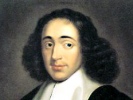
Sacred Texts Philosophy Spinoza Index Previous Next
Buy this Book at Amazon.com


Correspondence, by Benedict de Spinoza, [1883], at sacred-texts.com
[The difference between a true and an adequate idea is merely extrinsic, &c. The Hague, Jan., 1675.]
Honoured Sir.—Between a true and an adequate idea, I recognize no difference, except that the epithet true only has regard to the agreement between the idea and its object, whereas the epithet adequate has regard to the nature of the idea in itself; so that in reality there is no difference between a true and an adequate idea beyond this extrinsic relation. However, in order that I may know, from which idea out of many all the properties of its object may be deduced, I pay attention to one point only, namely, that the idea or definition should express the efficient cause of its object. For instance, in inquiring into the properties of a circle, I ask, whether from the idea of a circle, that it consists of infinite right angles, I can deduce all its properties. I ask, I repeat, whether this idea involves the efficient cause of a circle. If it does not, I look for another, namely, that a circle is the space described by a line, of which one point is fixed, and the other movable. As this definition explains the efficient cause, I know that I can deduce from it all the properties of a circle. So, also, when I define God as a supremely perfect Being, then, since that definition does not express the efficient cause (I mean the efficient cause internal as well as external) I shall not be able to infer therefrom all the properties of God; as I can, when I define God as a Being, &c. (see Ethics, I. Def. vi.). As for your other inquiries, namely, that concerning motion, and those pertaining to method, my observations on them are not yet written out in due order, so I will reserve them for another occasion.
As regards your remark, that he "who considers lines applied to curves makes many deductions with regard to the measurement of curves, but does so with greater
facility from the consideration of tangents," &c., I think that from the consideration of tangents many deductions will be made with more difficulty, than from the consideration of lines applied in succession; and I assert absolutely, that from certain properties of any particular thing (whatever idea be given) some things may be discovered more readily, others with more difficulty, though all are concerned with the nature of the thing. I think it need only be observed, that an idea should be sought for of such a kind, that all properties may be inferred, as has been said above. He, who is about to deduce all the properties of a particular thing, knows that the ultimate properties will necessarily be the most difficult to discover, &c.
395:1 Tschirnhausen.